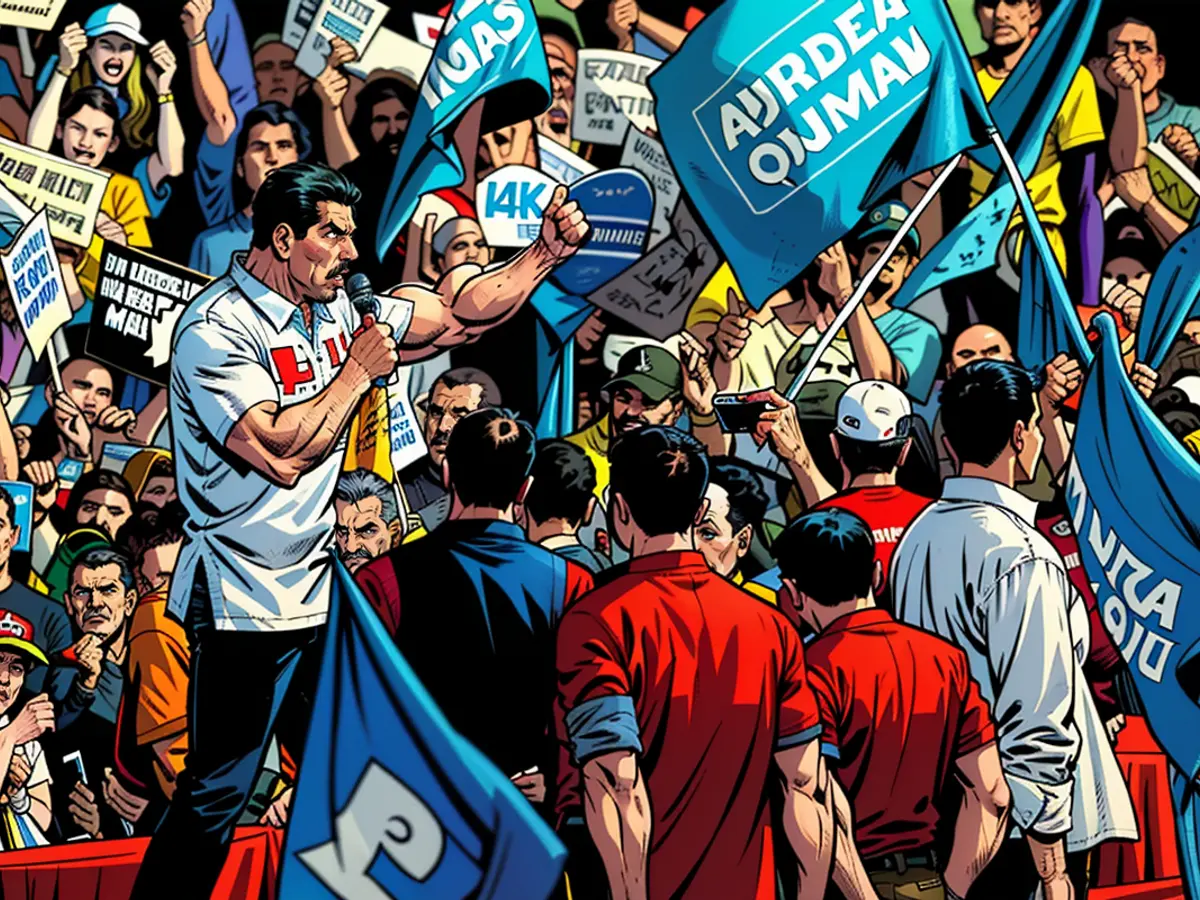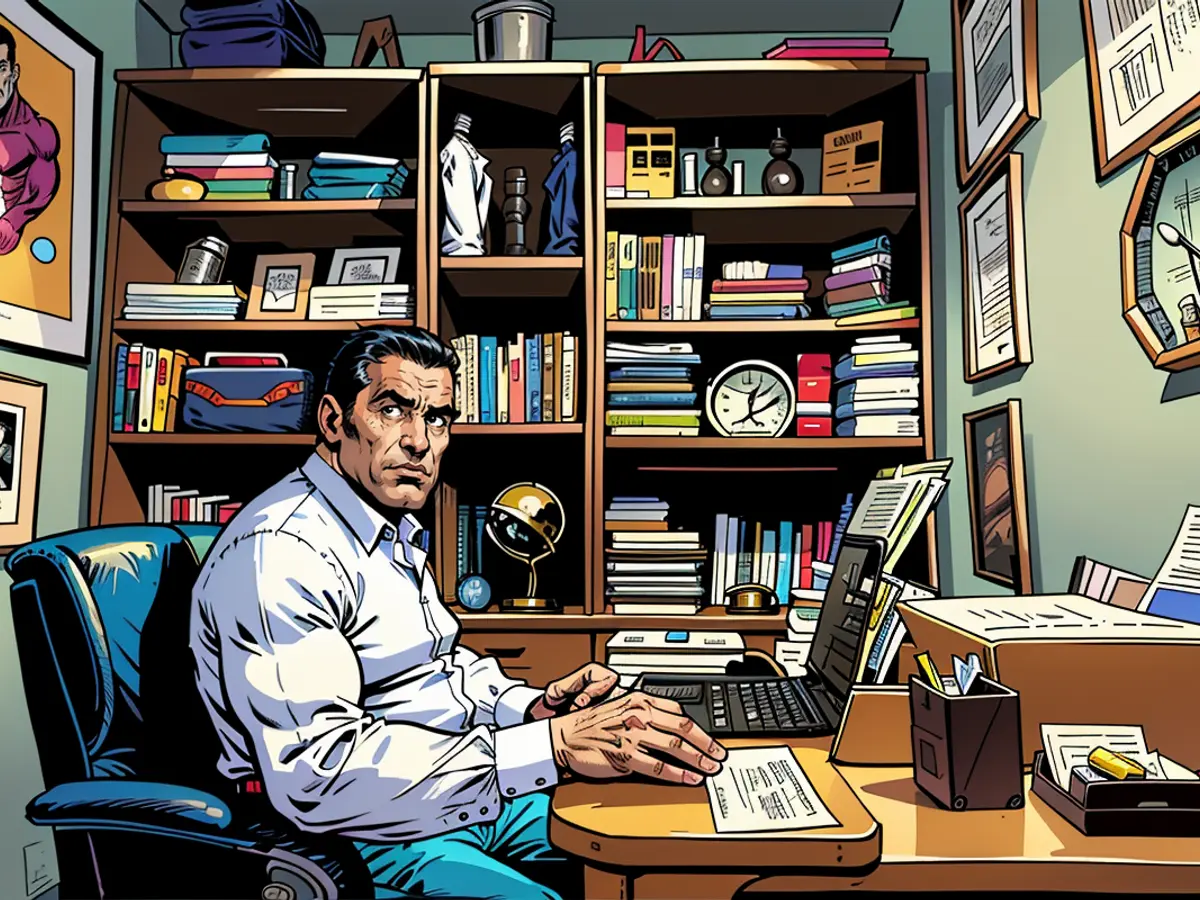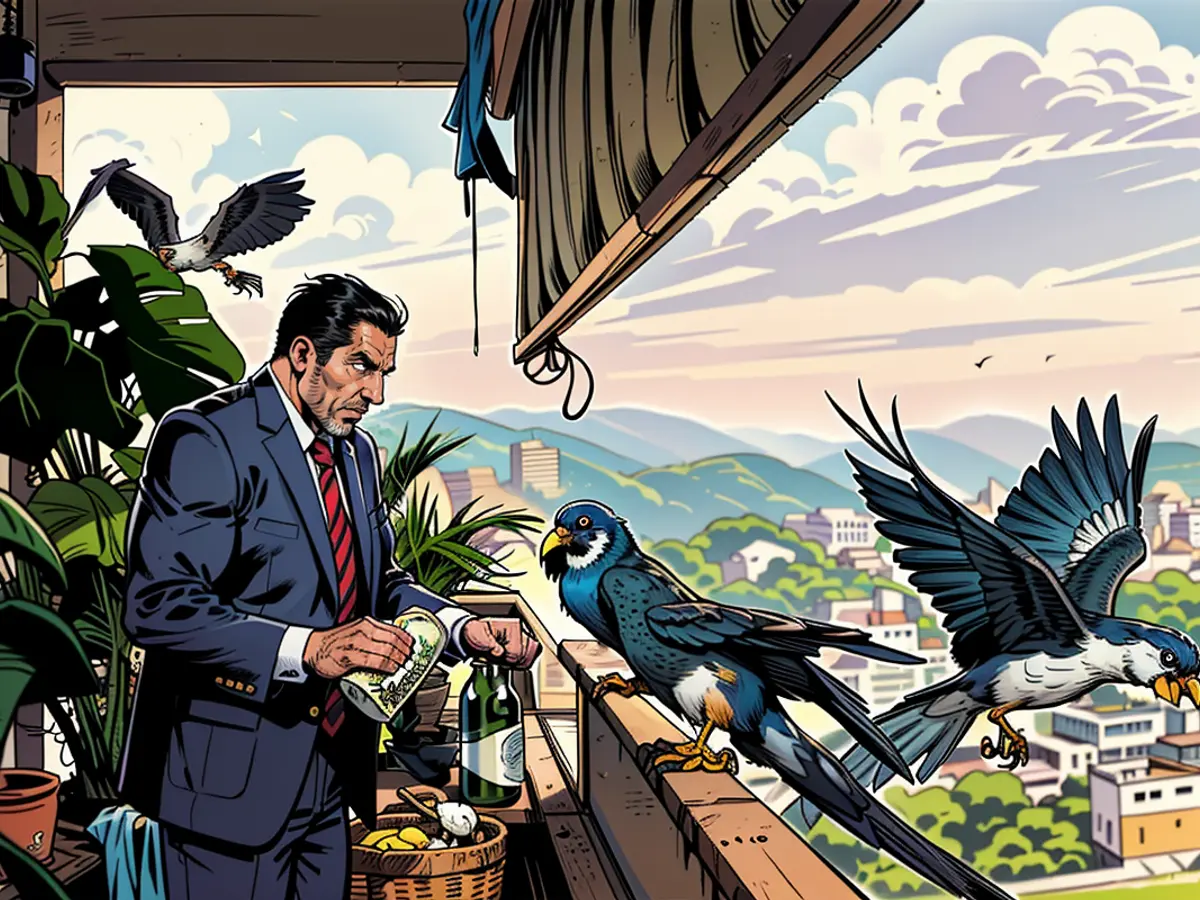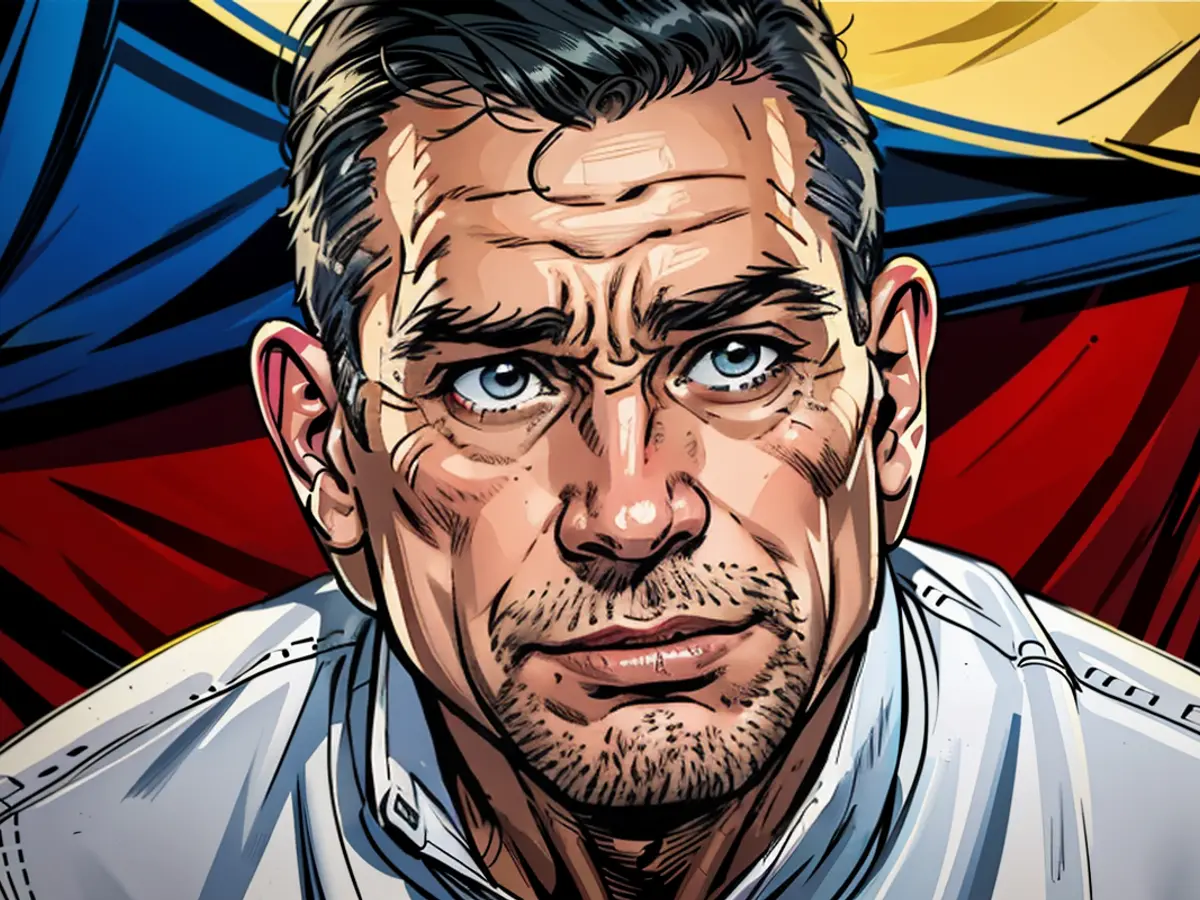A grandfather who enjoys watching birds will challenge Venezuela's strongman Maduro this summer.
Hugo Chavez, the deceased leader who still casts a prominent figure in Venezuela over a decade after his death, used to speak for hours on his TV show 'Hello President!' while Nicolas Maduro, his passionate successor, can also hold court for more than 60 minutes when the mood hits him.
Therefore, it's intriguing that the man aiming to face Maduro in Venezuela's upcoming presidential election is known for being tight-lipped.
Edmundo Gonzalez Urrutia, the lead representative of the significant opposition coalition named the Democratic Unitary Platform, speaks in brief sentences and frequently finishes before the interviewer can ask another question.
Despite this unconventional approach to engaging voters to confront an authoritarian leader who has held onto power by reportedly manipulating elections and violating human rights for the past ten years, Gonzalez isn't your typical Venezuelan politician.
He had a long career in foreign service (served as an ambassador to Algeria and Argentina) and then as an administrative assistant for the country's opposition before being chosen as a coalition candidate because Maria Corina Machado and Corina Yoris were denied the opportunity.
"I had never imagined I'd wind up in this position," he said to local media in late April when his candidacy was made official. However, since then, his composure and confidence have helped him gain a significant lead over Maduro, based on recent polls.
Challenging Maduro's virtually limitless control can be a treacherous venture. Over the years, he has detained or banished countless opposition leaders, some for extended periods. Additionally, politically motivated violence has claimed hundreds of lives in Venezuela throughout the past decade, predominantly committed by state security forces.
Yet, many experts believe Gonzalez presents the optimal opportunity the opposition has had to overthrow Maduro since 2013. His candidacy has already been confirmed for the July 28 election, and the government has yet to show any interest in pursuing him.
In October, the Maduro administration and the opposition, plus representatives from the United States, reached a comprehensive agreement in Barbados. Maduro vowed to hold free and fair elections in return for relief from American sanctions.
Despite a rocky rollout, the agreement has faced questions about the extent of it. While some US-imposed oil sanctions have been eased, numerous close associates of Maduro remain burdened with individual sanctions. In addition, Caracas withdrew an invitation for the European Union to send electoral monitors to watch the upcoming vote.
Gonzalez is unconcerned about potential retaliation, stating to CNN En Espanol that he is "very calm, confident although aware of the considerable challenge" the opposition confronts.
Regarding another potentially rigged election like the one in 2018 where Maduro won with widespread accusations of vote manipulation and opposition boycotts, Gonzalez speculates that international pressure might influence Maduro.

Although the global community probably won't interfere in Venezuela's affairs again following the 2019 failed uprising led by Juan Guaido, who declared himself interim president and attracted recognition from more than 50 countries only to see Maduro secure power and weather the crisis, Gonzalez seems hopeful.
"Fraud, vote manipulation, and threats are nothing new for us," Gonzalez told CNN En Espanol, "but we're hopeful that the massive opposition vote will guarantee our victory."
However, his family shares different sentiments. "We're definitely anxious," Gonzalez's daughter Mariana told CNN. "But we're trying to take things one day at a time because if we start thinking about potential consequences, we'll stop moving forward."
The pressing question
But with an authoritarian government firmly entrenched in power for decades, how do you persuade them to willingly relinquish control and lead a smooth democratic transition?
Gonzalez has never addressed this critical question regarding the July vote. Instead, he has merely hinted at possible strategies should he clinch victory and the electoral body acknowledges the result.
He declares that his immediate priorities would be reigning in inflation, a persistent affliction currently hovering at 64% year-on-year, and restoring trust in the power structures like the judiciary, which is currently stacked with Maduro's sympathizers.
The futures of Maduro and his inner circle – some of whom are under investigation in the Hague for crimes against humanity – are still undecided. But Gonzalez suggests the possibility of amnesty for departing officials when speaking to CNN en Espanol.
"In all political crises and power transitions, you often observe amnesty deals and judicial reconciliation," he said. "Therefore, I don't completely discard the idea of extending it to Venezuela."
The election is currently scheduled for late July, but Venezuela law obligates the victor to take office in January 2025. This 6-month interim period would require delicate management if Gonzalez pulls through. 1, 2
For the next six months, the president-elect will play a crucial role as they govern while the whole state apparatus is still controlled by the existing government, according to Sadio Garavini di Tullio, a classmate of Gonzalez who previously worked in the foreign office and helped manage the opposition during the Chavez years. Edmundo can potentially offer assurances to everybody associated with the regime, Garavini di Tullio said.

Gonzalez is not expected to be the president of the opposition government but rather the president of the transition government, he added.
Echoing Garavini di Tullio's remarks, George Eickhoff, a former German diplomat who served as director of the Konrad Adenauer Foundation in Caracas between 2008 and 2013 and remains close to Gonzalez, also emphasized Edmundo's non-revenge intentions. "Edmundo is a public servant. He knows there can be no retribution [against the government],” Eickhoff told CNN. “He has already started speaking to the other side. For the opposition, Machado is the fiery messenger to energize its base, while Edmundo is the voice of the more peaceful message - he's very grounded in his responsibilities."
Regarding allegations of ballot-tampering by the Maduro regime, Gonzalez put it mildly. "We understand we're facing a challenging opponent," he stated - then amended his statement, "a formidable opponent that is unapologetic about using any advantage their position grants them."
From the onset of the campaign season, both Machado, a conservative politician who's vying for the presidency since 2012, and Gonzalez have adopted a distinct public image. Machado has been drawing massive crowds to his rallies in various streets, while Gonzalez has maintained a calm demeanor from his Caracas home.
A photograph of Gonzalez hand-feeding four vibrant parrots local to Caracas, known as guacamayas, shot by Bloomberg photographer Gaby Oraa, provoked a widespread reaction in Venezuela.
Gonzalez's close associate, his daughter Mariana, explained, "They come every day, twice, thrice, four times... sometimes even ten. They're his friends. The guacamayas arrive in the morning and evening, and sometimes Edmundo spends hours merely feeding them sunflower seeds."
The image further illuminates Gonzalez's other interests: baseball, Real Madrid soccer club, family cookouts, and books.
The public believes Gonzalez resembles a national grandfather figure that could signal a fresh start following a decade of political hostilities, given his election slogan "Edmundo, president for all", the fact that he's 73 years old, and his responsibilities to his four grandchildren.
Two of his grandchildren now reside in Spain, among the nearly eight million Venezuelans who have emigrated in recent years. He hoped that an opposition triumph in July could lure some of this diaspora back to their homeland.
"It's time for our vast Venezuelan family to reunite once again," he said to CNN en Español, "For the adversary to be recognized as such, rather than labeled as an enemy."

Read also:
Despite the challenging political landscape in Venezuela, the Americas and the world are closely watching the upcoming presidential election. The Democratic Unitary Platform, a significant opposition coalition, has chosen Edmundo Gonzalez Urrutia as their candidate, a choice that has gained momentum due to Gonzalez's composure, confidence, and unconventional approach to engaging voters. The outcome of this election could have significant implications for the world, as experts believe Gonzalez presents the opposition's best chance to overthrow President Maduro since 2013. Regardless of the potential retaliation, Gonzalez remains hopeful, emphasizing the importance of free and fair elections and international pressure to influence Maduro's actions.







